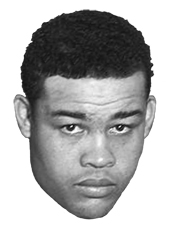






























Joseph
Louis Barrow (May 13, 1914 – April 12, 1981), best known as Joe Louis.
Louis had 69 professional fights with only three losses. He tallied
52 knockouts and held the championship from 1937 to 1949, the longest
span of any heavyweight titleholder. After returning from retirement,
Louis failed to regain the championship in 1950, and his career ended
after he was knocked out by Rocky Marciano in 1951. The man who had
been called the Brown Bomber was finished.
Early years
Louis’s
amateur performances attracted the interest of professional promoters,
and he was soon represented by a black Detroit area bookmaker named
John Roxborough. As Louis explained in his autobiography, Roxborough
convinced the young fighter that white managers would have no real
interest in seeing a black boxer work his way up to title contention.
Roxborough knew a Chicago area boxing promoter named Julian
Black who already had a stable of mediocre boxers against which Louis
could hone his craft, this time in the heavyweight division. After
becoming part of the management team, Black hired fellow Chicago native
Jack “Chappy” Blackburn as Louis’s trainer. Louis’ initial professional
fights were all in the Chicago area, his professional debut coming
on July 4, 1934, against Jack Kracken in the Bacon Casino on Chicago’s
south side. Louis earned $59 for knocking out Kracken in the first
round. $59.00 in 1934 is equivalent to 1,098.77 in 2016 dollars. Louis
won all 12 of his professional fights that year, 10 by knockout.
In
September 1934, while promoting a Detroit area “coming home” bout
for Louis against Canadian Alex Borchuk, Roxborough was pressured
by members of the Michigan State Boxing Commission to have Louis sign
with white management. Roxborough refused and continued advancing
Louis’s career with bouts against heavyweight contenders Art Sykes
and Stanley Poreda.
When training for a fight against Lee Ramage,
Louis noticed a young female secretary for the black newspaper at
the gym. After Ramage was defeated, the secretary, Marva Trotter,
was invited to the celebration party at Chicago’s Grand Hotel. Trotter
later became Louis’s first wife in 1935.
During this time, Louis
also met Truman Gibson, the man who would become his personal lawyer.
As a young associate at a law firm hired by Julian Black, Gibson was
charged with personally entertaining Louis during the pendency of
business deals.
Title contention
Although Louis’ management was
finding him bouts against legitimate heavyweight contenders, no path
to the title was forthcoming. While professional boxing was not officially
segregated, many white Americans had become wary of the prospect of
another black champion in the wake of Jack Johnson’s highly unpopular
(among whites) “reign” atop the heavyweight division. During an era
of severe anti-black repression, Jack Johnson’s unrepentant masculinity
and marriage to a white woman engendered an enormous backlash that
greatly limited opportunities of black fighters in the heavyweight
division. Black boxers were denied championship bouts, and there were
few heavyweight black contenders at the time, though there were African
Americans who fought for titles in other weight divisions, and a few
notable black champions, such as Tiger Flowers. Louis and his handlers
would counter the legacy of Johnson by emphasizing the Brown Bomber’s
modesty and sportsmanship. Biographer Gerald Astor stated that “Joe
Louis’ early boxing career was stalked by the specter of Jack Johnson”.

